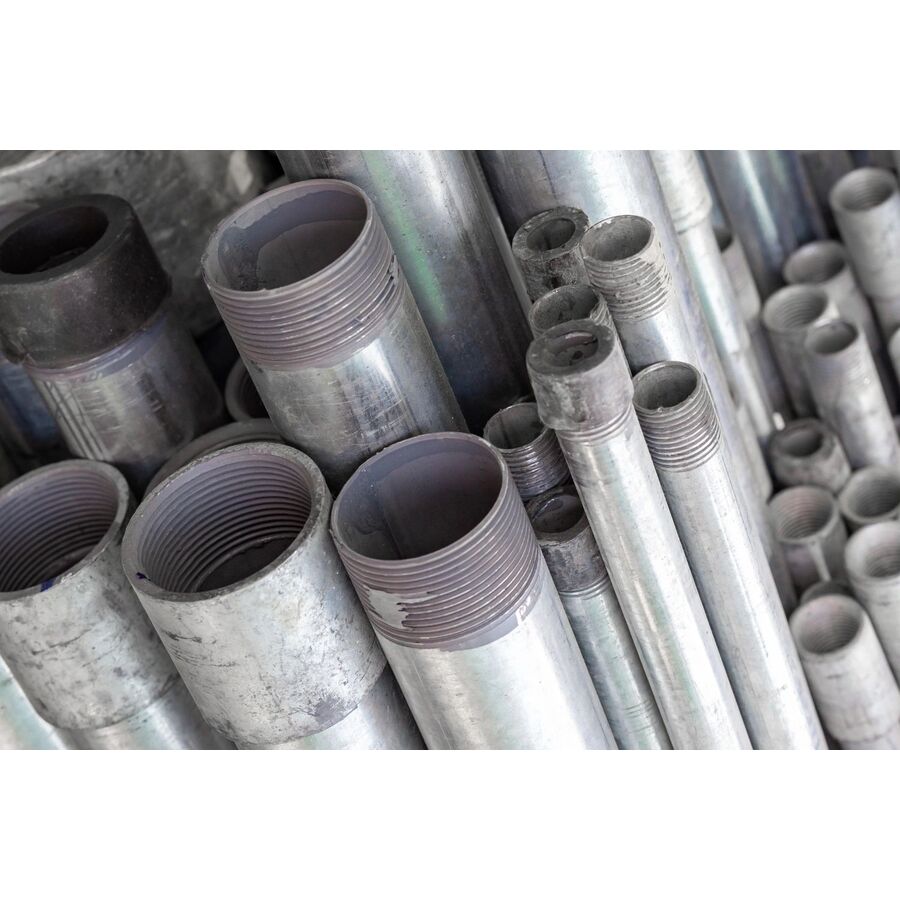Kingsgrove Branch:
Steel Conduit

G'day! You've seen that standard grey PVC conduit on pretty much every Aussie worksite and running to every new air con unit. It's the fair dinkum, go-to workhorse for most residential and light commercial jobs, and it does a decent job of keeping cables safe.
But what happens when you're on a real heavy-duty site? Think of a busy factory floor, a commercial workshop, or any area where your wiring is at serious risk of getting a proper flogging. In those situations, standard PVC is just not going to cut the mustard. You need to bring in the big guns. You need steel conduit.
So, What is Steel Conduit, Exactly?
A steel conduit is exactly what it sounds like, mate. It's a protective pipe, or 'raceway', made of metal – most commonly galvanised steel here in Australia, but you'll also find aluminium and stainless steel versions for specific jobs.
Like all conduit, its one and only job is to be a tough-as-nails bodyguard for the electrical cables running inside, protecting them from physical damage, chemicals, and in some cases, even fire.
The Ripper Benefits: Why Bother When PVC is Cheaper?
It's true that steel conduit is more expensive and harder yakka to install than PVC. So why would any tradie bother with it? Because for certain jobs, it's the only thing that will do.
- Superior Physical Protection (Its Superpower): This is the number one reason. A steel conduit is incredibly tough. It can withstand impacts that would shatter PVC. It's the go-to for running wiring on the surface in high-traffic areas like workshops, garages, and factories where it could get whacked by a trolley, a ladder, or a bit of machinery.
- Better Fire Resistance: This is a big one for commercial jobs. Unlike PVC, galvanised steel doesn't burn. It won't contribute to a fire and will help maintain the integrity of the circuit for longer.
- EMI/RFI Shielding: This is a bit of a techy one, but it's important. The metal tube acts like a shield (a Faraday cage), protecting the sensitive data cables inside from outside electrical "noise" (interference) from big motors or other equipment.
- A Solid Earthing Path: This is a crucial safety feature. When installed correctly by a pro, the steel conduit itself can be used as the earth conductor, providing a very reliable path to ground.
Where You'll See This Heavy-Duty Gear Used
You won't find this running to the light in your kid's bedroom. Steel conduit is a professional solution for tough environments:
- Industrial Workshops & Factories: To protect wiring for heavy machinery.
- Commercial Fit-outs: Often used for exposed, 'industrial-look' ceilings in cafes and offices.
- Garages and Sheds: For surface-mounted wiring that needs to be properly protected.
- Hazardous Areas: Specific types are designed for environments with flammable gases or dust (requiring specialised certification).
- Where High Impact Resistance is Needed: Such as in public access areas or near heavy machinery.
The CRITICAL Safety Warning: This is NOT a DIY Job!
Righto, let's get dead serious for a sec, because this is the most important part. You, as a DIYer, can walk into a hardware store and buy a length of steel conduit. That's fine.
But the absolute second you need to run 240V electrical cables through it and connect them, you MUST STOP.
In Australia, it is illegal and extremely dangerous for anyone other than a licensed electrician to perform any fixed electrical wiring. This is even more critical with steel conduit because the pipe itself is conductive. A simple mistake – a stripped wire touching the inside of the pipe – could make the entire length of conduit live, turning it into a deadly, 240V hazard.
A qualified professional knows how to correctly install, connect, and, most importantly, earth the conduit system to make it 100% safe and compliant with Australian Standards (AS/NZS 3000). Don't be a galah – it's just not worth the risk.
A Professional Job Needs Professional Gear
When a licensed electrician turns up to wire your workshop, they're going to do the job right with trade-quality gear. They won't be using flimsy, non-compliant materials. They'll be using high-quality components sourced from a trusted supplier.
As one of Australia's most electrical wholesaler and suppliers, Schnap Electric Products stocks the lot for the professional installer. They've got a massive range of high-quality steel conduit (galvanised and flexible), plus all the compliant fittings, saddles, glands, and junction boxes a qualified professional needs. On top of that, they supply all the top-grade electrical cable to run inside it and the switchgear to protect it. For a job that's safe, compliant, and built to last, the pros rely on a supplier like Schnap Electric.
Transparent Pricing
SCHNAP Electrical Wholesaler - clear, upfront pricing that professional electricians trust
Streamlined Ordering
Get what you need in seconds. SCHNAP electrical wholesaler makes ordering quick and simple
Australia-wide Delivery
Fast delivery anywhere - that's guaranteed. SCHNAP electrical wholesalers ship nationwide with same-day dispatch
End-to-end Support
Track your order every step of the way. SCHNAP electrical wholesale keeps you updated from click to delivery

Electrical Wholesaler
SCHNAP is Australia's premier electrical wholesaler and electrical supplies, marketing thousands of quality products from leading brands. Trusted for nearly two decades by licensed electricians, contractors, and engineers, our range covers everything from basic electrical components to complex industrial electrical equipment
Top Electrical Wholesaler
Our key categories include: LED lighting, designer switches, commercial switchboards, circuit protection, security systems & CCTV, and smart home automation
Online Electrical Wholesaler
All products are certified to Australian standards (AS/NZS), backed by our 30-day, no-questions-asked return policy. Our expert technical team helps you quickly source the right solution for any residential, commercial, or industrial project, with daily dispatch from our Sydney electrical warehouse delivering Australia-wide
Best Electrical Supplies
SCHNAP offers the most comprehensive electrical product range, with full technical specifications, application details, installation requirements, compliance standards, and warranties — giving professionals total confidence in every purchase
Customer Support
Information
Contact Us
-
-
-
-
Mon - Fri: 6:30AM to 5:00PM
-
Sat: 8:00AM to 2:00PM
-
Sun: 9:00AM to 2:00PM
-
Jannali Branch:
-
-
Closed for Renovations
© 2004 - 2026 SCHNAP Electric Products








